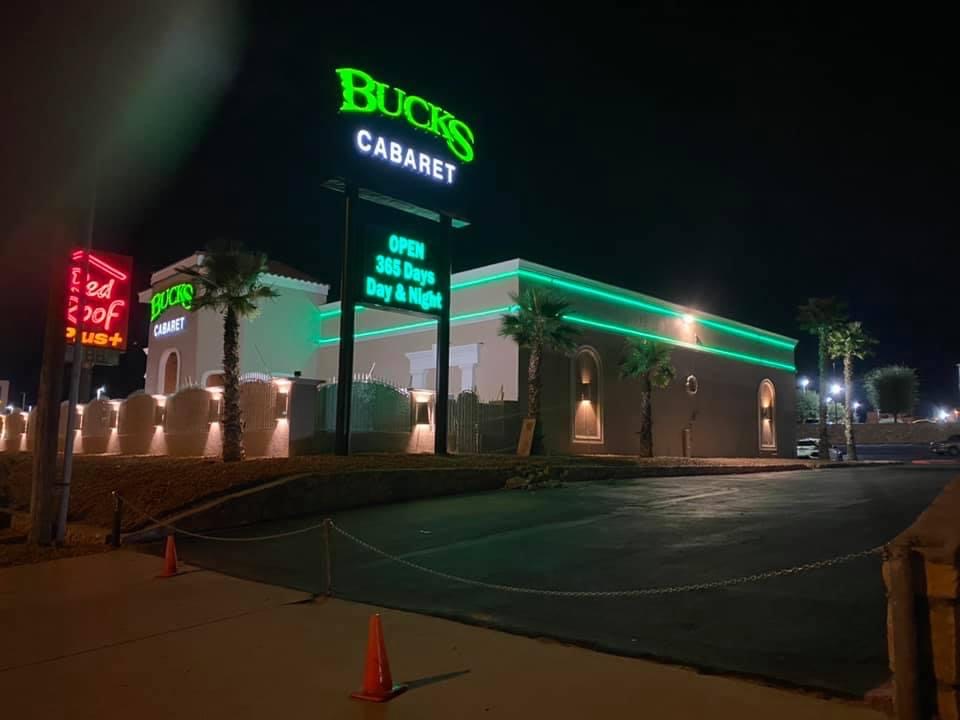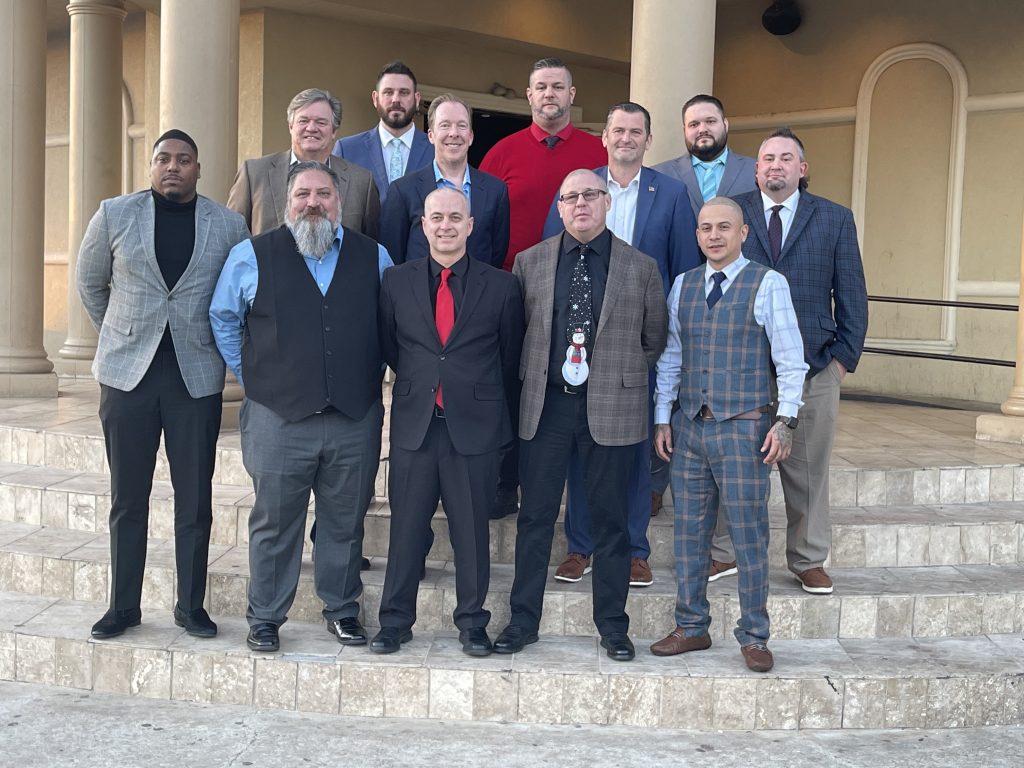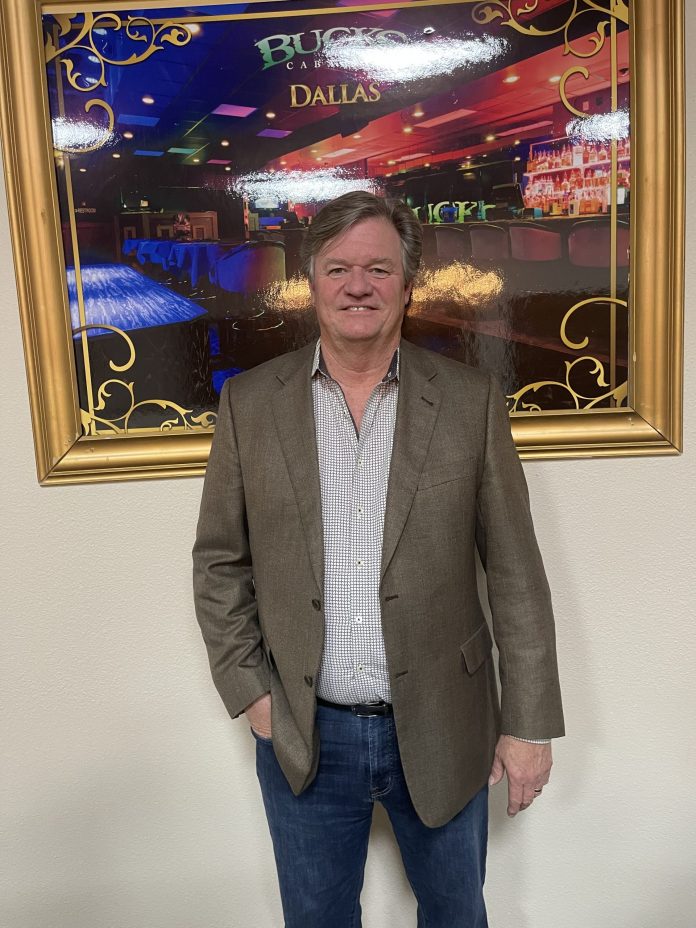(Note: This story appears in the January 2022 issue of ED Magazine)
Though he first ventured into adult club ownership way back in 1984, Curtis Wise emerged as a major player in the industry with the birth of the Bucks chain in 2010. Today, the Bucks brand is 12 clubs strong and growing outside of Texas to Ohio, South Carolina and Pennsylvania.
Curtis Wise, owner, and founder of the Bucks club chain, opened his first adult club, Flashdance, in 1984 in Waco, Texas. Now, over three decades later, Wise owns or co-owns 12 Bucks clubs today and counting, in four states including Texas, South Carolina, Pennsylvania and Ohio.
Industry veteran Jason Mohney of GO Best speaks highly of his business partner and friend. “Curtis is a great partner, and the Bucks team is a top-notch, excellent organization,” says Mohney. “Through Bucks’ daily team meetings and imaginative leadership, Curtis drives to be the best in each market. Curtis’ operational expertise is unsurpassed; his influence is far-reaching throughout our industry.
Wise developed the Bucks concept in 2010 after taking an eight-year hiatus from operations to earn two degrees in marketing and entrepreneurship while working full-time for Chuy’s Tex-Mex Restaurants. Wise became intrigued with Chuy’s customer service model, something he realized was sadly lacking at many of the adult nightclubs he’d visited, and he decided to bring it to his clubs.
“Our industry was just about gimme your money, sit down, shut up, don’t cause trouble, rather than a party atmosphere with good customer service,” says Wise. “I have a saying; sometimes clubs will succeed despite what they are doing.”
We had the chance to speak with Wise about the Bucks concept, the importance of partnerships, and exactly what it takes to rank amongst the best clubs in an area like Dallas that is known for its plethora of high-quality adult club venues.
ED: Though you’re now considered one of the industry’s top owner/operators, you started with the Chuy restaurant chain. What did you learn from your time there that helped you become a successful club operator?
Wise: Chuy is now publicly-traded; they only had two stores but some basic concepts back when I worked with them. Their number-one mantra was do everything possible for the customer. Number two was, clean as you go; constantly clean. Number three was, have fun. Chuy’s culture allowed different personalities working together; it needn’t be homogeneous. At some other chains, everybody’s the same. I’m talking about the business’ culture. Employees earned less at Chuy’s, but your “shit-factor” was small. Or you could work elsewhere, make more, with a significant shit factor. So kind of a trade-off in quality of life. Bucks provides the best of both worlds. Good quality of work and life from how we treat our people and the money to go with it; kind of a double-double. They don’t have to trade anything.
ED: What distinguishes Bucks clubs from other operators in Dallas and around the country?
Wise: Having the most parties, events, and energy. It isn’t always about price; it can be about value-per-seat. A guest might spend $200 at Bucks and have an unbelievable time, while another guest spent $200 at a competitor and left thinking nobody even knew his name. It touches on the volume, which increases the party. You could go to a nightclub, wait in line, enter, and it’s cool. Or walk right into another nightclub with not nearly the energy, which wasn’t as much fun.

ED: Talk about your team meetings, punctuality and attention to detail.
Wise: Details are crucial. To be on time, be early. Our daily shift meetings and weekly managers’ meetings are critical to our focus. Too often in our industry, punctuality gets ignored. Always open on time; don’t close early. We strive for more than the minimum. But that minimum is if you open Saturdays at 11 a.m., you’re open at 11, not 12 or 12:15. It hurts the club when a manager arrives late, and staff waits in the lot. If customers repeatedly find the business closed at opening time, they’ll go elsewhere. They’ve learned you won’t provide a show at that time. Soon, that club is cutting hours, claiming no day business. They’ve killed their day shift. There’s business; they just didn’t chase it. Soon nighttime employees begin routinely showing up late.
ED: So your team meetings set the mood?
Wise: Yes, at the start of the day and shift change. The night shift crew doesn’t just show up and start working. We talk about the focus, upcoming events, and areas of concern. It could be the food or drink special or whatever. It’s not long, just 5-10 minutes.
“Always open on time; don’t close early. It hurts the club when
a manager arrives late, and staff waits in the lot. If customers repeatedly find the business closed at opening time, they’ll go elsewhere. They’ve learned you won’t provide a show at that time. Soon, that club is cutting hours, claiming no day business. They’ve killed their day shift. There’s business; they just didn’t chase it.”— Curtis Wise
ED: What’s your approach to pricing, aside from discount days?
Wise: We ensure our independent contractor entertainers follow the set-price personal dance language in their attorney-approved contracts. Unless you routinely monitor to always maintain clear, set pricing, you’ll run-off middle-of-the-road customers with limited resources and infrequent customers who are amateur at negotiating with entertainers. We constantly monitor our pricing, including always taking receipts to tables. You don’t want waitresses charging customers $14 for two drinks instead of $4 on $2 discount days.
ED: What is the philosophy regarding food at your clubs?
Wise: Most of our clubs serve food. People ordering food must have reasonable ticket times and hot food. We work hard to ensure that. We don’t profit from food. It’s a loss but a significant add-on to the overall experience when you’re selling $7-10-dollar drinks. It keeps people there and helps us be responsible neighbors.
ED: At recent EXPOs, Bucks’ entire staff has worn identical shirts and stood out. Were you making a statement?
Wise: Absolutely! We’ll do it again with different colors each day. We want to declare that Bucks is here and growing.

ED: While you offer VIP sections like other clubs, you also feature more weekly discount drink nights than most competitors. What’s your rationale?
Wise:: When I first discounted in 2010, we did $1 beer. One manager begged me to raise prices. A year later, he came back and said, “I thought you were utterly wrong about discounting, but I see now that you’re right.”
People say discounting brings penniless customers. We charge cover and serve regular-priced food. When you consider all your line items, it’s up like visiting Target to buy $1-a-gallon milk and leaving with $200-300 in groceries.
I was also concerned about customers who only visit our club on discount nights. I thought we’d shifted them to that night, but I was mistaken. You’ve taken that customer from elsewhere that night, whether it’s Hooters, pizza night at another club, or whatever. You’ve brought them to your establishment and transformed them. Now it’s their spot. I sincerely believe we’ve got more regulars than anyplace, anywhere. That’s what we do and how we develop VIPs. We make it unthinkable for them even to consider visiting competitors. If we do everything right, they won’t.
ED: Unlike operators who shun partnerships, you partner with Jason Mohney of GO Best and others. Why do partnerships work for you when other operators avoid them?
Wise: That’s a good question. I thought it would be beneficial to both sides. I initially partnered with Jason and Harry Mohney. In 2006 I licensed, flipped, and sold Harry an SOB tract. It’s where the Dallas Bucks Cabaret sits today. They never developed it, and I approached him in 2010 to repurchase it, but we never agreed on a number. In 2012, I suggested we partner on it. It took a while to put it together and build. We opened in 2015; the rest is history. Then Jason invited me on the second one in South Carolina, and I accepted, I invited him on the third one, and now we’ve got three together.
ED: Your brand is well established in your markets in Texas. Why venture elsewhere?
Wise: Two reasons: I saw value and opportunities for market domination. There are, what I consider, three really good clubs in Greenville, South Carolina; we own two. We just bought the number-one club in Toledo (Ohio), redid it, and bought another. There’s one under construction now. So there will be four Toledo clubs worth visiting, and we own two, including what I believe is the best one. So that goes back to dominating the market.
In addition, we own the real estate or have the option for all but one of our locations. There’s great underlying value in owning the property because now we’ll never fight with our landlords; that’s one more vulnerability we can avoid.
It’s important to support ED Magazine and the Expo. ED brings information to light and tries to help everybody in our industry because when people in our industry do things the right way, it reflects on everybody. When they do it wrong, it also reflects on everybody. If we don’t support Expo, we won’t have an industry. — Curtis Wise
ED: Texas has no shortage of adult nightclubs. How do you attract and retain workers in such a competitive environment?
Wise: We ensure our managers and leaders can make far more money working for us than for any competitor, based on incentives on the number of waitresses, entertainers, sales of memberships, bottles, or champagne. Everything is based on performance. We give our people the parameters and the ability to use initiative. We retain the entertainers and staff by delivering more customers than anywhere else in that market.
I come from a family of educators; my mother was a retired school teacher. I was taught that you could be as much as you want to be; it’s there for you to achieve with no ceilings. That’s what we’re trying to teach our people.
ED: Bucks Cabaret won an award at the 2021 ED’s Awards Show at EXPO in Miami for feeding your people during the COVID shutdown. What did winning that specific award mean to you?
Wise: It’s always good to be recognized by your peers. It was unexpected and not just about me; it was about our chef and Scott Discianno. Scott coordinated the whole effort. Scott and his wife Emily were there, handing out food every day. When someone in Fort Worth couldn’t get to the Dallas kitchen to pick it up, Scott would deliver it to Fort Worth.
ED: It seems as if it’s your goal at Bucks to bring people on for years — an entire career, even — rather than just planning on having them there for six months or a year.
Wise: I believe work relationships should start with permanence in mind. I recognize that to some, we’re just a point in time in their life. We approach it long-term from our end. That’s the only way to approach it with all that goes with buying in; you must be all-in. If not, it’s better not to even start, just do something else. That’s part of our philosophy. We want everybody to understand the playbook. I believe it’s important to enter into that relationship that way. I think more companies should consider that thought process. Generally, they don’t, and it shows with their employee retention. The further you go down the line, the harder that is to fulfill that from a company standpoint, but we still try.
ED: Bucks is a longtime sponsor of the Annual EDI Contest Series. Why is that commitment important to you?
Wise: We don’t book many features, but we support feature entertainers who put tremendous effort into their shows, some of which are fantastic.
It’s important to support ED Magazine and the Expo. ED brings information to light and tries to help everybody in our industry because when people in our industry do things the right way, it reflects on everybody. When they do it wrong, it also reflects on everybody. We’ve got the Expo legal panels, all the brilliant minds that show up annually to help us. We always have access to them, but they’re accessible at Expo even to small operators trying to grow or someone striving to buy a club. It enables their growth. If we don’t support Expo, we won’t have an industry.
Larry Kaplan has for 20 years been the Legal Correspondent for ED Publications. In addition, Mr. Kaplan is a business broker in the sale and purchase of adult nightclubs and adult retail stores and the Executive Director of the ACE of Michigan adult nightclub state trade association. Contact Larry Kaplan at 313-815-3311 or email larry@kaplanclubsales.com.





























